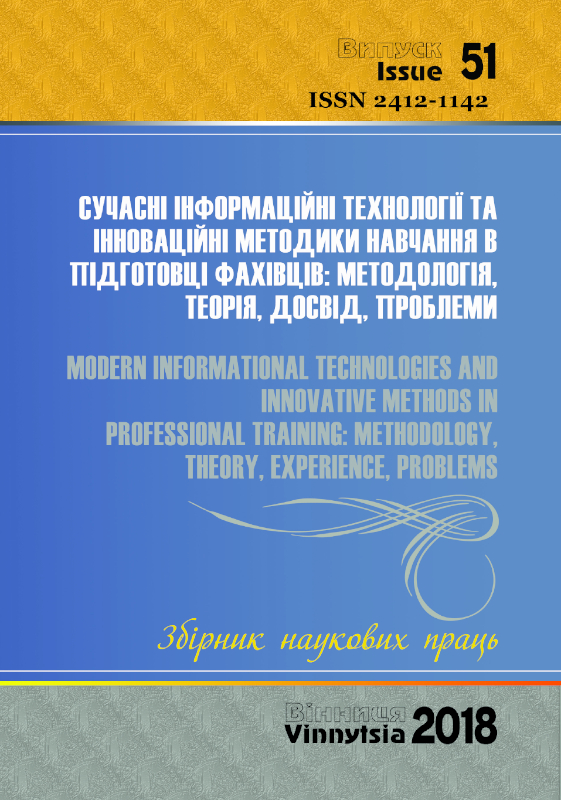INFORMATION CULTURE OF THE FUTURE ART TEACHER AS A COMPONENT HIS PROFESSIONAL TRAINING
Keywords:
information culture of a specialist, scientific approaches, information technology, informational educational environmentAbstract
In the article, various approaches to the definition of "information culture" are investigated and
analyzed; the content of the concept as a general scientific, as well as pedagogical problem and the basis of
professional activity of a teacher is revealed. Interrelations of information culture as a part of organizational culture of
an educational institution are characterized and its components are defined. The value and significance of
informational culture in which information is the basis for making organizational decisions in achieving operational
and strategic success and using information technologies as a tool for improving the efficiency of information systems
is proved.
The research describes the process and determines the stages of developing information culture, highlights its
main characteristics and properties, establishes the levels and criteria for shaping information culture of future
specialists.
It is proved that the developing information culture involves mastering the following components of
information competence: differentiation and allocation of meaningful information; development of information
evaluation criteria; creation of information and its use.
Downloads
References
Войханская К. М., Смирнова Б. А. Библиотекари и читатели об информационной культуре / К. М. Войханская, Б. А. Смирнова // Оптимизация библиотечно-библиографического обслуживания специалистов: сборник материалов в помощь разработке проблемы «Библиотека и научная информация». – Л., 1974. – Вып. 2. – С. 92–96.
Генсерук Г. Особливості формування інформаційної культури майбутніх фахівців / Г. Генсерук // Професійна освіта: Наукові записки. Серія: Педагогіка. – 2008. – No8. – c. 92–95.
Джинчарадзе Н.Г. Інформаційна культура особистості / Н.Г. Джинчарадзе. – К.: Наукова думка, 1996. – 256 с.
Лазаренко Н. І. Структурні компоненти інформаційної культури викладача педагогічного вищого навчального закладу / Н. І. Лазаренко // Наукові записки Вінницького державного педагогічного університету імені Михайла Коцюбинського.Серія : Педагогіка і психологія. – 2016. – Вип. 47. – С. 18 – 22.
Малахова О. Підвищення професійної компетентності управлінських кадрів на засадах акмеологічного підходу / О.Малахова // Рідна школа: Наук.-педагог. журн. – Київ, 2011. – No 4–5. – С. 52–56.
Муромцев В. В., Муромцева А. В. Формирование информационной культуры в условиях доминирующей роли виртуальных коммуникаций / В. В. Муромцев // Труды XIII Чаяновских чтений. Социальное государство: Вызовы XXI века: Москва, 14 марта / Отв. ред. Н. И. Архипова. М.: Изд-во РГГУ, 2013. – С. 184.
Семенюк Э. П. Информационная культура общества и прогресс информатики / Э. П. Семенюк // НТИ. Серия 1. – 1994. – No 7. – С. 2–7.
Ginman M. Information culture and business performance / M. Ginman // IATUL Quarterly: A Journal of Library Management and Technology. – 1988. – Vol. 2 (2). – pp. 93–106.
Choo C. W. Information management for the intelligent organization: the art of scanning the environment / C. W. Choo. – 3rd ed. Medford, NJ: Information Today, Inc., 2002. – 325 p.
Curry A. and Moore C. Assessing information culture: An exploratory model / A. Curry // International Journal of Information Management, 2003. – Vol. 23 (2). – pp. 91–110.
Oliver G. Information culture: exploration of differing values and attitudes to information in organizations / G. Oliver // Journal of Documentation. – 2008. – Vol. 64 (3). – pp. 363–385.
Downloads
Published
Issue
Section
License
Copyright (c) 2018 В. Шахов, С. Зеленюк

This work is licensed under a Creative Commons Attribution 4.0 International License.

